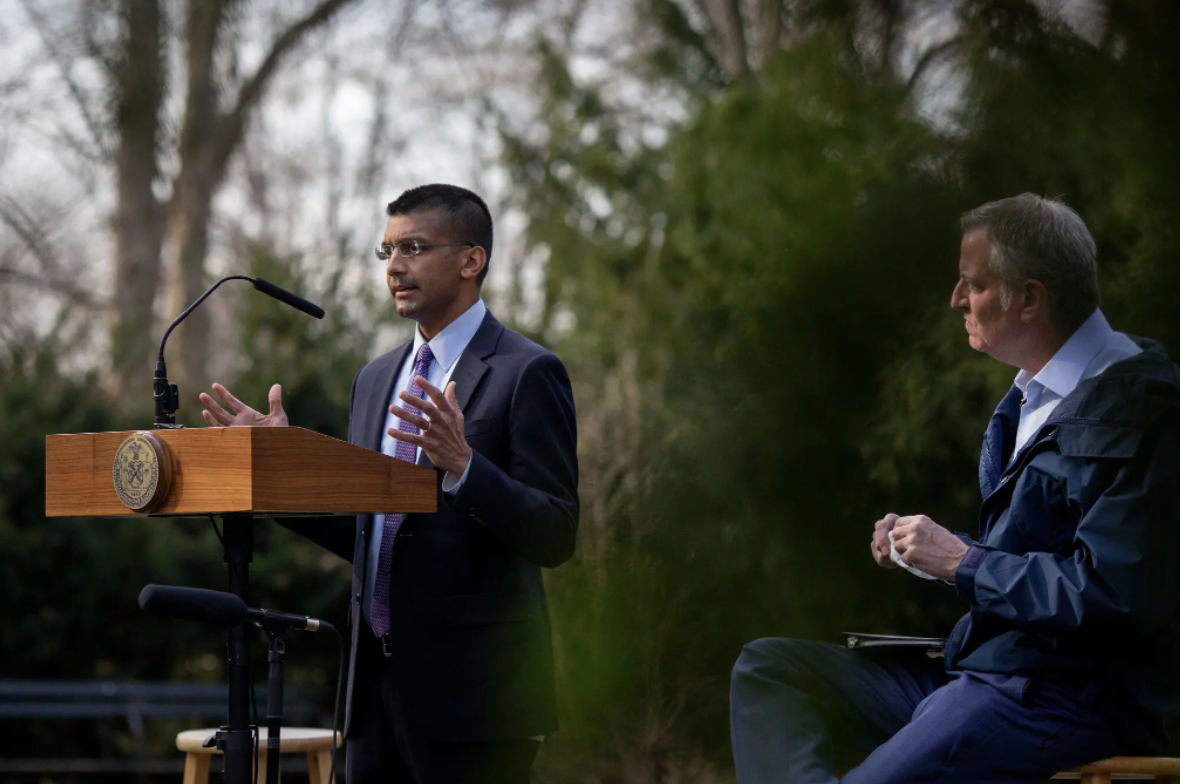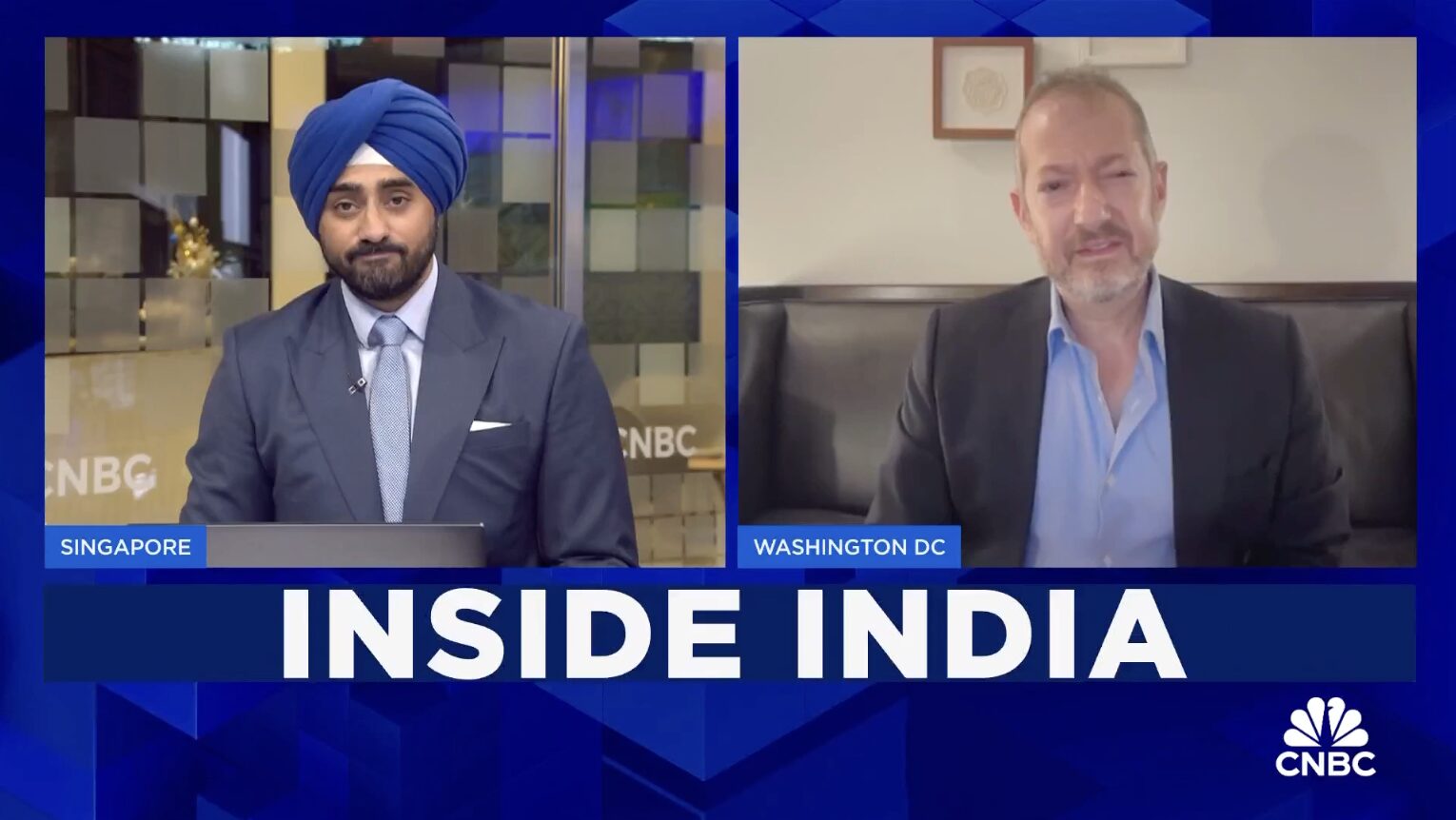
Dr. Sanjay Gupta: Explains the Science of Mouth-Taping
There’s a new sleep trend making waves: taping your mouth shut at night. Advocates say it can help you breathe better, sleep deeper, and even…
Thought Leader: Sanjay Gupta

Five months into the pandemic, Dr. Dave A. Chokshi took on the greatest challenge of his career: helping to guide New York City in its fight against the coronavirus as the new health commissioner.
He quickly became the face of the city’s efforts, joining Mayor Bill de Blasio at his daily Covid-19 briefings and appearing in television ads encouraging New Yorkers to wear masks and get tested.
Behind the scenes, Dr. Chokshi, a Rhodes Scholar and son of Indian immigrants, helped direct the city’s aggressive measures to combat the virus: a proof-of-vaccination requirement for indoor dining and gyms, and a vaccine mandate for teachers and police officers that eventually extended to all private employees.
In many ways, the policies worked. Roughly 87 percent of adult New Yorkers are fully vaccinated, and hospitalizations and deaths were not as severe in the city during the Omicron wave as they might have been had vaccination rates been lower.
Dr. Chokshi, 40, who was appointed in August 2020, stepped down on Monday. His successor, Dr. Ashwin Vasan, the former president of Fountain House, a New York-based mental health nonprofit, will face continuing challenges, including increasing vaccination rates for children and encouraging New Yorkers to get booster shots.
Dr. Chokshi, the city’s first health commissioner of Asian descent, reflected on his tenure in an interview with The New York Times. The conversation has been condensed and edited.
Q: What are one or two areas where you think the city’s response really excelled? What are one or two areas where things have not gone as well as you hoped, and where you still feel New York is vulnerable should we see another surge in cases?
A: Well, I’ll start by saying that it’s been the honor of a lifetime to have served as health commissioner during this unprecedented public health crisis. It was something that we all experienced so deeply with respect to the tragedy and the suffering that so many families bore witness to and experienced very directly.
In terms of our response as a city, one area where I do believe that we excelled — both in terms of directly serving New Yorkers, but also being an exemplar for the entire country and in some ways the world — is our vaccination campaign. We just hit 17 million doses administered in New York City. But far more important is what that means with respect to the immense suffering that has been prevented. We estimate that about 48,000 lives were saved, over 300,000 hospitalizations were averted and about 1.9 million cases were prevented.
On the second question, what comes to mind is a report that we put out last week, which showed that the hospitalization rate for Black New Yorkers was more than twice that of white New Yorkers during the Omicron wave. This was despite relatively similar vaccination rates.
That inequity was actually worse than what we have seen in prior waves. And this is something that I felt very deeply because it happened on our watch, and it happened despite a huge amount of effort that we have put behind addressing health equity, and particularly racial equity.
That is work that we have to take forward with urgency, with a redoubled commitment and with a cleareyed understanding that there are deep-rooted factors. Many of them are anchored in structural racism that we need to contend with, and that we need to say are unacceptable even if they have been condoned for generations.
Q: On a lighter note, New Yorkers got to know you from the constant TV commercials you were featured in. Did New Yorkers recognize you on the street?
A: I’ve never been one to seek the spotlight. I certainly never imagined that this would be a significant part of my role.
But I also have to say that it’s been so beautiful and poignant in many ways. A couple of stories come to mind. I was walking with my family in our neighborhood, and a gentleman ran out of a salon. He pointed to his wife, who we could see through the window getting her nails done, and he came running outside to stop me and said, “Man, she’s so proud of your Spanish P.S.A.s. She got vaccinated because of you.”
Then a South Asian mother actually walked up to me on Election Day last year and told me, “My daughter is thinking about studying public health because she sees someone who looks like her on the news.”
Q: Have you gotten to know Dr. Vasan in recent months? Do you think he’ll take a similar approach as you did?
A: He and I have had many conversations, usually multiple times a day as we prepare for this transition in leadership. And I think that what people will find is that he has a genuine passion and deep expertise in public health, and particularly in mental health. And I think that that’s so well matched to the moment that we’re in because of all of the ways in which we are confronting what I think of as the parallel pandemics. All of the reverberating effects that have less to do with the virus, but more about the chasms and the cracks that it’s exposed in our society, whether it has to do with loneliness and social isolation, or how people are dealing with grief and stress and trauma..
Q: If your tenure, in terms of the restrictions and the mandates, was marked by being cautious, do you think he’ll have a similar approach, especially if cases spike again?
A: I think there will be continuity in that respect. But I would say that we considered it to be less cautious and more bold — bold with respect to protecting people. I actually think about all of our public health measures as protections rather than restrictions and doing the things that even if they are sometimes unpopular or politically not as expedient, that we know will save the most lives and prevent the most suffering.
Q: There has been some criticism as you’ve rolled back some of the mandates. I spoke to health experts who, knowing you, speculated that you probably would have liked to have kept Key to N.Y.C., but that you had to factor in the political realities. And you really wanted to keep the emphasis on the city worker and private employer mandate.
A: We always have to strike a balance. There is, on the one hand, still the imperative to take Covid very seriously. This wave of Covid may be ebbing, but that does not mean that the pandemic is ending. So we have to make sure that we’re not throwing the baby out with the bath water in terms of keeping the things that have helped to protect us, particularly the mandates that you’ve referred to, which New York City has been leading the nation in: the public sector mandate, as well as the private sector mandate.
On the other hand, we have to recognize that things have shifted in a real way. Our transmission level is lower than it has been in many months, and it’s below the threshold that the C.D.C. previously considered the boundary between substantial and moderate transmission. So those are real gains. And when we put everything together, we have to recognize that people are embracing a new phase of the pandemic. And our responsibility is to ensure that we continue to protect people even as we recognize that people will be doing things differently because the overall risk is lower.
Q: It sounds like Mayor Eric Adams is very much open to a Covid-19 vaccination requirement in September for public school students, and some elected officials have called for that. Do you think that’s something the mayor should consider?
A: Yes, it certainly warrants serious consideration. It has to be done methodically and thoughtfully in a way that recognizes that so many parents and families still need to have conversations with people whom they trust, whether it’s pediatricians or otherwise, in order to get to a place where they feel more comfortable vaccinating their child. But the benefits of childhood immunization are unequivocal. We have vaccine requirements for so many other pediatric vaccinations.
Q: Some people with disabilities or those who are immunocompromised feel like they’re getting left behind. What would you say to those who feel like it’s not back to normal for them yet?
A: Well, I understand, and I empathize. This is something that I’m hearing from many of my own patients as well. That it feels like the rest of the world is sort of moving on, even as their risk remains very real. And this is something that we need to elevate as part of our discourse and have the ability to speak to the nuances that everyone’s risk level is different.
From that perspective, it means that all of society needs to be comfortable, for example, with people who will continue wearing masks, even when they are optional. And then from a policy or governmental perspective, we have to center people with disabilities, people who are immunocompromised, people who are at higher risk for a variety of other reasons, including marginalization, and make sure that our policies are responsive to their lived experience.
Q: What’s next for you?
A: I’m planning to take care of some of the things that are dearest to me, and that I haven’t had as much time for over the past two years as I would have liked. So, for instance, pickups and drop-offs and field trips with my little daughter, and I have a few hundred dinners that I owe and have to cook for my wife, given how much she has supported me during this tenure. I will also continue taking care of my patients at Bellevue Hospital, and I’ll be doing some writing and teaching as well.
Dr. Sanjay Gupta: Explains the Science of Mouth-Taping
There’s a new sleep trend making waves: taping your mouth shut at night. Advocates say it can help you breathe better, sleep deeper, and even…
Thought Leader: Sanjay Gupta
Joe Grogan: The Alzheimer’s Economic Threat
Social Security could become insolvent in as little as eight years, with more people retiring and living longer and fewer paying into the program. Alzheimer’s disease is…
Thought Leader: Joseph Grogan
Evan Feigenbaum on the outcomes of Putin’s India visit
Evan Feigenbaum of the Carnegie Endowment for International Peace argues that none of India’s major challenges can be meaningfully addressed by deepening ties with Russia.…
Thought Leader: Evan Feigenbaum

